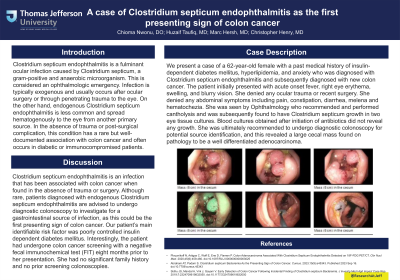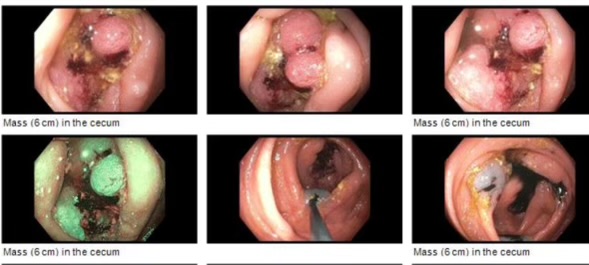Sunday Poster Session
Category: Colon
P0266 - A Case of Clostridium septicum Endophthalmitis as the First Presenting Sign of Colon Cancer
Sunday, October 27, 2024
3:30 PM - 7:00 PM ET
Location: Exhibit Hall E

Has Audio
- CN
Chioma Nwonu, DO
Thomas Jefferson University Hospital
Philadelphia, PA
Presenting Author(s)
Award: Presidential Poster Award
Chioma Nwonu, DO, Huzaif Taufiq, MD, Marc Hersh, MD, Christopher Henry, MD
Thomas Jefferson University Hospital, Philadelphia, PA
Introduction: Clostridium septicum endophthalmitis is a fulminant ocular infection caused by Clostridium septicum, a gram-positive and anaerobic microorganism. This is considered an ophthalmologic emergency. Infection is typically exogenous and usually occurs after ocular surgery or through penetrating trauma to the eye. On the other hand, endogenous Clostridium septicum endophthalmitis is less common and spread hematogenously to the eye from another primary source. In the absence of trauma or post-surgical complication, this condition has a rare but well-documented association with colon cancer and often occurs in diabetic or immunocompromised patients.
Case Description/Methods: We present a case of a 62-year-old female with a past medical history of insulin-dependent diabetes mellitus, hyperlipidemia, and anxiety who was diagnosed with Clostridium septicum endophthalmitis and subsequently diagnosed with new colon cancer. The patient initially presented with acute onset fever, right eye erythema, swelling, and blurry vision. She denied any ocular trauma or recent surgery. She denied any abdominal symptoms including pain, constipation, diarrhea, melena and hematochezia. She was seen by Ophthalmology who recommended and performed cantholysis and was subsequently found to have Clostridium septicum growth in two eye tissue cultures. Blood cultures obtained after initiation of antibiotics did not reveal any growth. She was ultimately recommended to undergo diagnostic colonoscopy for potential source identification, and this revealed a large cecal mass found on pathology to be a well differentiated adenocarcinoma
Discussion: Clostridium septicum endophthalmitis is an infection that has been associated with colon cancer when found in the absence of trauma or surgery. Although rare, patients diagnosed with endogenous Clostridium septicum endophthalmitis are advised to undergo diagnostic colonoscopy to investigate for a gastrointestinal source of infection, as this could be the first presenting sign of colon cancer. Our patient’s main identifiable risk factor was poorly controlled insulin dependent diabetes mellitus. Interestingly, the patient had undergone colon cancer screening with a negative fecal immunochemical test (FIT) eight months prior to her presentation. She had no significant family history and no prior screening colonoscopies.

Disclosures:
Chioma Nwonu, DO, Huzaif Taufiq, MD, Marc Hersh, MD, Christopher Henry, MD. P0266 - A Case of </i>Clostridium septicum</i> Endophthalmitis as the First Presenting Sign of Colon Cancer, ACG 2024 Annual Scientific Meeting Abstracts. Philadelphia, PA: American College of Gastroenterology.
Chioma Nwonu, DO, Huzaif Taufiq, MD, Marc Hersh, MD, Christopher Henry, MD
Thomas Jefferson University Hospital, Philadelphia, PA
Introduction: Clostridium septicum endophthalmitis is a fulminant ocular infection caused by Clostridium septicum, a gram-positive and anaerobic microorganism. This is considered an ophthalmologic emergency. Infection is typically exogenous and usually occurs after ocular surgery or through penetrating trauma to the eye. On the other hand, endogenous Clostridium septicum endophthalmitis is less common and spread hematogenously to the eye from another primary source. In the absence of trauma or post-surgical complication, this condition has a rare but well-documented association with colon cancer and often occurs in diabetic or immunocompromised patients.
Case Description/Methods: We present a case of a 62-year-old female with a past medical history of insulin-dependent diabetes mellitus, hyperlipidemia, and anxiety who was diagnosed with Clostridium septicum endophthalmitis and subsequently diagnosed with new colon cancer. The patient initially presented with acute onset fever, right eye erythema, swelling, and blurry vision. She denied any ocular trauma or recent surgery. She denied any abdominal symptoms including pain, constipation, diarrhea, melena and hematochezia. She was seen by Ophthalmology who recommended and performed cantholysis and was subsequently found to have Clostridium septicum growth in two eye tissue cultures. Blood cultures obtained after initiation of antibiotics did not reveal any growth. She was ultimately recommended to undergo diagnostic colonoscopy for potential source identification, and this revealed a large cecal mass found on pathology to be a well differentiated adenocarcinoma
Discussion: Clostridium septicum endophthalmitis is an infection that has been associated with colon cancer when found in the absence of trauma or surgery. Although rare, patients diagnosed with endogenous Clostridium septicum endophthalmitis are advised to undergo diagnostic colonoscopy to investigate for a gastrointestinal source of infection, as this could be the first presenting sign of colon cancer. Our patient’s main identifiable risk factor was poorly controlled insulin dependent diabetes mellitus. Interestingly, the patient had undergone colon cancer screening with a negative fecal immunochemical test (FIT) eight months prior to her presentation. She had no significant family history and no prior screening colonoscopies.

Figure: Figure 1. Colonoscopy image showing mass in the cecum
Disclosures:
Chioma Nwonu indicated no relevant financial relationships.
Huzaif Taufiq indicated no relevant financial relationships.
Marc Hersh indicated no relevant financial relationships.
Christopher Henry indicated no relevant financial relationships.
Chioma Nwonu, DO, Huzaif Taufiq, MD, Marc Hersh, MD, Christopher Henry, MD. P0266 - A Case of </i>Clostridium septicum</i> Endophthalmitis as the First Presenting Sign of Colon Cancer, ACG 2024 Annual Scientific Meeting Abstracts. Philadelphia, PA: American College of Gastroenterology.

